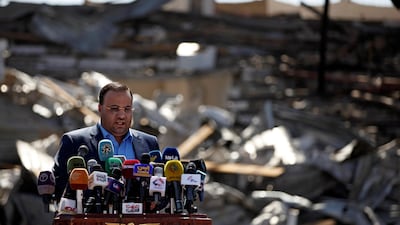As head of the Houthis' supreme political council and the second-in-command of the rebel force, Saleh Al Sammad oversaw much of the killing that has triggered the worst humanitarian crisis of our time. Few will shed any tears after he was tracked and killed by a Saudi-led coalition airstrike last Thursday. His is the most prominent loss to the Houthis since the coalition first intervened in March 2015 at the behest of Yemen's legitimate government. Desperate to keep their grip on Sanaa since seizing the capital in 2014, the Houthis are now on the back foot, having lost dozens of military commanders. They have resorted to launching more than 100 missiles and drones at civilian targets in Saudi Arabia in a bid to spread their legacy of havoc and chaos, although all have been intercepted. Yet still they cling on, incapable of proper governance or a military victory yet unwilling to surrender. They have squandered numerous opportunities for a peaceful resolution and repeatedly refused all attempts to engage in negotiations, both with the internationally recognised government and the GCC-backed National Dialogue committee, which includes all Yemen parties. Instead, they fight on, determined to prolong a war that has left 10,000 dead and 2 million displaced. The worst cholera outbreak in history is but one aspect of the globe's most savage humanitarian crisis. The civilian cost has been devastating. In the latest incident, under investigation by the coalition, an airstrike reportedly hit a wedding tent, killing more than 20 people.
This is the legacy of the Houthi invasion, bolstered by weaponry and training from Tehran, which is determined to disrupt the Middle East. When former president Ali Abdullah Saleh withdrew his support for the Houthis last year and announced he was prepared to negotiate with the coalition, there was a brief glimmer of hope. Within hours he was assassinated, because the Houthis don’t want peace, but further violence.
But they will fail in this mission. Al Sammad's death came as government and coalition forces made gains in the cities of Hodeidah and Taez after liberating the coastal city of Midi. His replacement with the even more hardline Mahdi Al Mashat is a worrying development. The Houthis cannot be allowed to succeed in destroying Yemen. The Iranian regime and Hezbollah have choreographed the conflict to advance their ambitions in the region. As long as they continue, it is Yemen's innocent millions who will continue to suffer.

